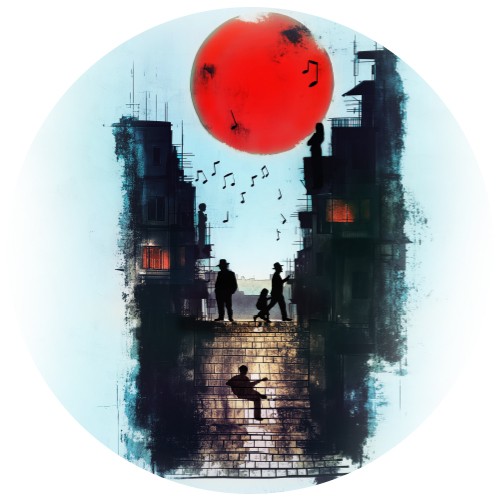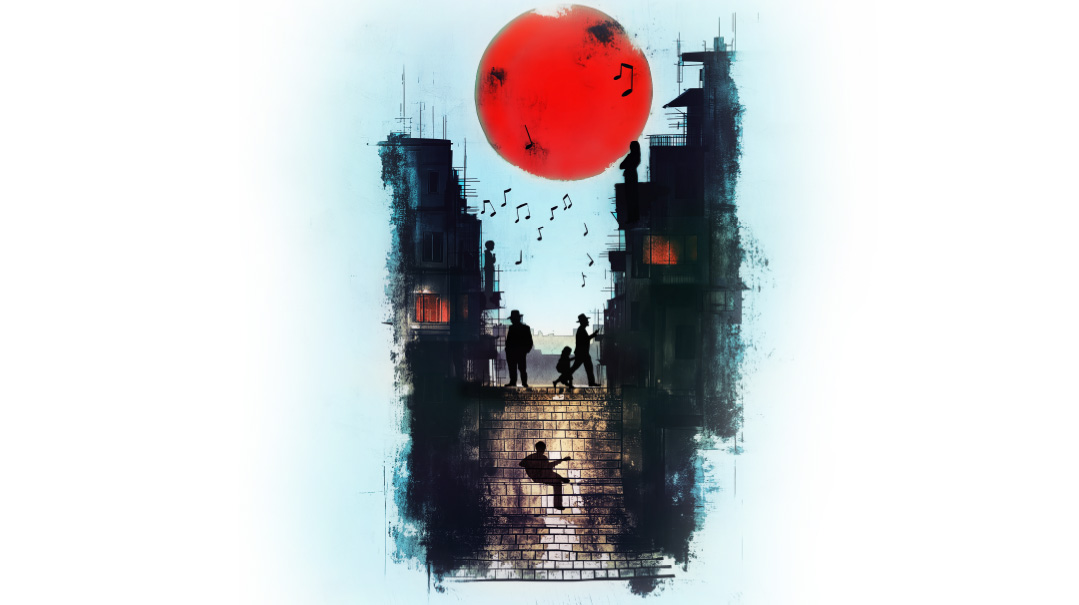Face the Music: Chapter 2

She swept her head back defiantly and motioned to the other grandmother. Together they left the NICU

Someone’s monitor was beeping. Marissa scanned the four incubators in the room. It was Ayala Weinstein, her third apnea episode tonight. Marissa briskly walked over to the incubator and gave the tiny foot a pinch. A shudder jolted through the baby’s body, and her tummy started to rise again rhythmically.
Marissa studied the monitor carefully. Ayala’s sats were rising, and her breathing seemed steady. Hopefully, she’d keep it up for the rest of the shift.
Marissa went back to her computer and checked the list she’d composed four hours earlier. The Azoulai twins – Baby A and Baby B, no names yet — would need another dose of antibiotics soon. She checked the paper on which she’d written down their weights and started the calculating process.
“Marissa?” That was Lali’s voice coming from the main desk.
“Hmmm,” she said in response, mulling over the numbers. Baby A had weighed in at 1.04 kilo at the beginning of the shift; that meant that….
“Marissa!” Lali sounded urgent now. “We have an admission. I’m sending him to your room, okay?”
“Coming,” Marissa said.
She checked Ayala’s monitor again. Everything looked steady.
At the front desk, a labor and delivery nurse was standing next to an incubator, fussing with wires. Inside the incubator was a tiny baby wearing only a diaper. Matti, one of the staff pediatricians, was busy checking the monitor. Two Arab women in long dark dresses, heads swathed in solid, severe colors, hovered anxiously at the desk. Lali had opened up a new file and was studiously entering the new patient’s information.
“Jabarin, naeam?” she asked the two women. Marissa presumed they were the grandmothers. No way was the mother of such a fresh preemie in a state to accompany him to the NICU.
The shorter woman answered curtly. “Naeam.”
Lali kept up her typing. Then she beckoned to Marissa.
“It was a C-section. Week 29. His weight is pretty good – around 1.2 kilo. They had to intubate him in the delivery room, though.” She looked knowingly at Marissa.
Marissa studied the baby in the incubator. His skin was an angry reddish-purple, plastered with at least five different stickers attached to wires. A tube led out of his mouth. His legs were curved abnormally, and his fingers and toes seemed frozen at impossibly stiff angles. It wasn’t her job or her right to guess at a diagnosis, but she wondered whether there was some genetic deformity at play.
She took a deep breath and looked at the two grandmothers. Unlike Lali, a proud Moroccan-Israeli who slipped easily into fluent Arabic whenever necessary, Marissa’s Arabic vocabulary could probably be counted on less than two hands. Even her Hebrew still had a distinctly American accent.
“Shalom, I’m Marissa,” she said in basic Hebrew. “I’m one of the nurses on shift right now in the NICU, and I’m going to be admitting the baby to my room. We’ll do some simple tests, to check his breathing and his muscle tone and a few other things. We’re going to keep him on oxygen and start giving him nutrition. Right now he’s too fragile for anyone to hold him, but you’re welcome to come visit in a few hours.”
She put her hand on the incubator. One of the grandmothers backed away. The other moved forward and scrutinized the grotesquely curved legs.
She hurled a string of rough Arabic words in Lali’s direction.
The other grandmother’s shoulders jerked upward in response.
“Limadha?” Lali asked.
Marissa knew that word: why?
The woman answered with another string of words, her tone harsh.
Lali shrugged and responded calmly. Marissa didn’t understand her answer, but it sounded crisp, official, and entirely stripped of emotion.
The woman spat on the floor. She swept her head back defiantly and motioned to the other grandmother. Together they left the NICU.
“What was that all about?” Marissa asked.
“The first jida, she doesn’t realize what is happening yet,” Lali said, using the Arabic word for grandmother. “The second recognized the baby’s defect. She knows. She had a brother or sister with the same defect, or maybe a child. It is something that runs in families.”
Marissa nodded. Her medical training in the American Midwest had only included a perfunctory mention of the chromosomal disorders common when closely related parents marry one another. But working here in Israel, she’d gotten all too encompassing an education on the topic. Many of the Arab babies brought to the NICU suffered from genetic conditions common to their parents’ chamoulas — conditions that affected breathing, head size, facial features, skeletal structure, and internal organs.
“The second jida, she asks why we even bother to treat the baby,” Lali went on. “She knows this condition, she says. There is nothing to hope for.”
“And what did you tell her?”
“That our job is to care for the babies with the tools and information we have. We can’t make any genetic diagnosis without a doctor. And when we have information, we share it with the parents.”
Not the grandmothers, Marissa caught the implication.
“She didn’t seem very happy,” she said.
Lali turned up her hands and rolled her eyes heavenward. “She is upset. Anyone would be upset, after a day like she is having. But the spitting…” She pursed her lips. “I will call Tamara to clean it up.”
Marissa marveled at Lali’s pragmatism. She gripped the incubator and started wheeling it toward her room.
“You answered her very well,” she said.
Lali’s mouth remained firmly set, but a tinge of warmth entered her dark eyes. “I will come soon to help you assess the baby,” she promised.
“Wow, this is some apartment,” Lazer said as Shloimy showed him in. “Is your mother a decorator or something? Is your grandfather a big gvir?”
Shloimy tried to look at his home with fresh eyes, the way Lazer would. The living room stretched before them cool and serene, with pale gray walls, darker gray couches, and accent pillows in varying combinations of midnight blue and silver. Fresh tulips stood in a vase in the middle of the dining room table, picking up the light that filtered through the pale periwinkle curtains. An impressionistic painting of the Kosel in pinks, purples, and blues spanned the wall over the biggest couch, and framed family portraits clustered over the opposite wall.
Was his apartment really so fancy? He’d never noticed it before. Maybe by Israeli standards?
“Nah, my mother’s not a decorator,” he told Lazer. “I guess it’s just that she’s American.”
The second question – was his grandfather a big gvir? — he chose not to answer. Motti Weiss wasn’t on the A-list of America’s tzedakah patrons, but he couldn’t be too poor if he bankrolled a kollel for his son to run.
Lazer nodded, right eyebrow arched skeptically.
“Anyway, I keep the guitar and the keyboard in my room,” Shloimy said. “Follow me.” He sincerely hoped his room was plain enough not to provoke any comments from his new friend, who’d barely paid him any attention their entire first year in yeshivah but now — after hearing him mention a guitar — suddenly seemed very interested in spending time together.
Lazer jumped on the guitar as soon as Shloimy pulled it out. He seated himself on the empty bed Yehuda had left behind when he moved on to yeshivah gedolah, and gave an experimental strum.
“Nice tone,” he said, as the warm twang filled the room. He gestured toward the keyboard standing in the corner. “Do you know Ishay Ribo’s ‘Gam Ki Elech?’ ”
“Yeah,” Shloimy said, “but I’m better on the guitar than the keyboard. Can we switch?”
Lazer jumped up. “Sure,” he said. He positioned his fingers over the keys. “We’ll do it in A minor, does that work for you?”
Shloimy nodded. “Yeah, A minor is perfect.”
Lazer creased his forehead and the evocative chords of the intro filled the room. Shloimy breathed in the mix of hope and tension that his new friend managed to infuse into each one. At the first chorus, he began a gentle picking.
As they broke into the second round, Shloimy closed his eyes and strummed harder, driving emotion and passion into the simple sequence of chords. They reached the last couple of lines, and he noticed Lazer bringing down the volume. Instinctively, Shloimy adjusted his sound. Once again the music was soft, contemplative, sweet.
Shloimy put down his guitar. “How did you know to do that?” he asked.
“To do what?” Lazar said.
“To change the — umm, the mood, I guess?” Shloimy tried.
Lazer smiled. “You know what they say about colors, that different colors put you in different moods?”
Shloimy shook his head. He’d never heard this.
“Green makes you calm,” Lazer explained. “That’s why doctors’ offices are green. Red makes you excited. It’s intense. So music is the same. You can decide where you want your music to be intense, where you want it softer, where you want it to scream and where you want it to ask a question. You just have to know how to play it.”
Shloimy listened, wide-eyed. He recognized some deep truth in Lazer’s words, but he couldn’t quite connect it to his own playing. He was very proficient — he’d come a long way since fifth grade, when a very insightful rebbi had told the musically clueless Chaim and Perri Weiss your son needs music lessons. His parents had followed instructions — they were pretty good at that, he had to admit — and so began his years of lessons.
Now he could play just about any of the frum songs he heard, segueing from chord to chord or from strumming to picking without any amateur squeaks or screeches. But what was Lazer was doing was completely different from proficiency.
“Here, I’ll show you,” Lazer said. He closed his eyes for a moment, then put his hands down on the keys again. “I’m going to play a song, and switch the mood in the middle. Listen.”
He started with a collection of major chords, one leading to the next with intuitive confidence. Then, from the lower register of the keyboard, he introduced a note of foreboding. The cluster of minor chords that followed was more tentative, more seeking.
“You hear it?” he asked.
Shloimy nodded just as he heard a soft knock on his door.
“So,” Lazer said, “it’s not just the chords themselves—”
“Shloimy?” Perri asked as she opened the door. “You’re home? Now?”
“Hi, Ma,” he said sheepishly, setting down the guitar.
“Is everything okay?” she asked.
Why aren’t you in yeshivah? he heard.
“Everything’s good,” he said. “Ma, this is Lazer, from my yeshivah. He plays keyboard, and he wanted to show me some interesting stuff with music. So we decided to make a quick stop here during bein hasedorim.”
“Oh,” she said. Her eyes were narrow, untrusting. “That’s nice.”
She stepped out and closed the door, but not before her eyes darted toward the clock.
Shloimy looked at it, too. It was a quarter past three. There was no way he and Lazer would be back in yeshivah in time for second seder.
“Uh, Lazer?” he said uneasily, gesturing toward the clock. “Isn’t the mashgiach going to be upset at us?”
Lazer shrugged. “Nu,” he said. “It wouldn’t be the first time.”
To be continued….
(Originally featured in Mishpacha, Issue 1034)
Oops! We could not locate your form.



